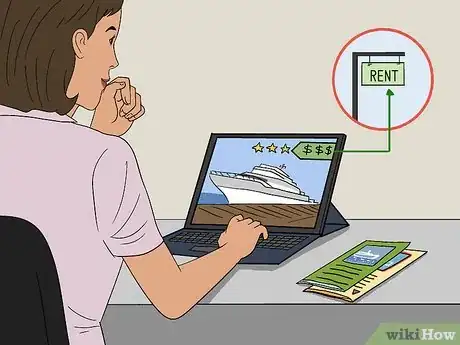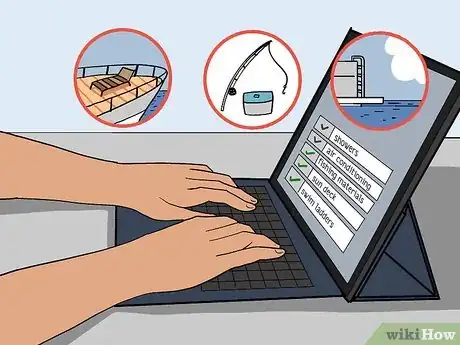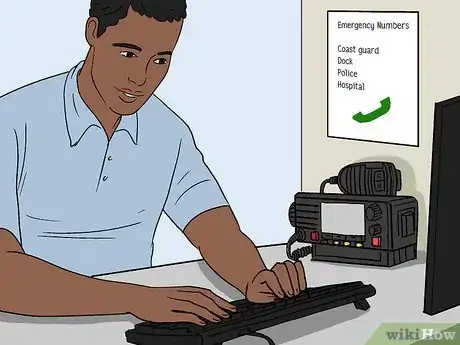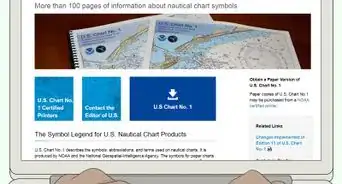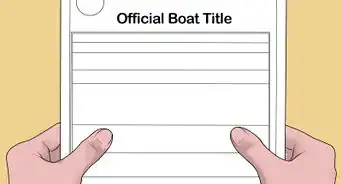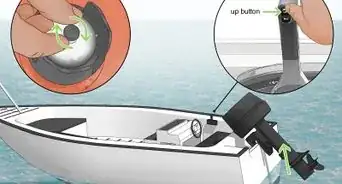This article was co-authored by wikiHow staff writer, Eric McClure. Eric McClure is an editing fellow at wikiHow where he has been editing, researching, and creating content since 2019. A former educator and poet, his work has appeared in Carcinogenic Poetry, Shot Glass Journal, Prairie Margins, and The Rusty Nail. His digital chapbook, The Internet, was also published in TL;DR Magazine. He was the winner of the Paul Carroll award for outstanding achievement in creative writing in 2014, and he was a featured reader at the Poetry Foundation’s Open Door Reading Series in 2015. Eric holds a BA in English from the University of Illinois at Chicago, and an MEd in secondary education from DePaul University.
There are 9 references cited in this article, which can be found at the bottom of the page.
This article has been viewed 11,627 times.
Learn more...
Even when you aren’t using your boat, the maintenance costs, insurance premiums, and dock fees can pile up. Renting out your boat is a phenomenal way to make some of that money back! You may even turn a serious profit if you can get a steady stream of renters on to your boat. Unfortunately, you cannot rent your boat out privately unless you start a business, which is difficult without a fleet of ships. However, there are plenty of platforms and businesses you can work with to get renters into your boat.
Steps
Choosing a Rental Platform
-
1Lease the boat to charter companies in your area to lower your risk. This is really straight forward and simple. Call the boat rental companies and charters in your area and ask them if they’re looking for more boats. Private companies often utilize additional ships during the busy season, and if they’re interested, you can work the details out with the business’s operator.[1]
- If you go this route, all you need to do is meet with the owner of the rental company and agree on a contract. They’ll do the rest of the work.
- This option won’t earn you as much money, but you won’t take on any real risk since you won’t need to worry about fuel, insurance, or crew fees.
- Opening your own boat rental company or cruise line is really only an option if you have a fleet of boats and a few hundred thousand dollars to pay for the licensing, insurance, fleet, and crews. It’s one of the biggest undertakings from a business perspective, but it’s certainly possible if this is your dream![2]
-
2Select Boatsetter to list your boat on the biggest rental platform. Outside of working out a deal with a local company, the only way to rent out your boat is with a peer-to-peer service (P2P), which is sort of like a rideshare or Airbnb service for boats. The most popular P2P boat rental service is Boatsetter. On the Boatsetter website, you set your price, choose your policy details, and rent your boat out on a case-by-case basis to interested parties.[3]
- Boatsetter is the biggest of these companies, which makes it easier to find customers on this platform. The other main advantage is that Boatsetter will connect you with a captain if you don’t want strangers operating your boat or you don’t want to worry about finding captains on your own.
- You can visit Boatsetter to sign up at https://www.boatsetter.com/.
Warning: You can’t just list your boat online and rent it out privately. It requires a business license and a special form of insurance only available to rental companies. If you don’t go through a local business, you must use a peer-to-peer service.
Advertisement -
3Pick another P2P rental company if you prefer their platform. Choose another P2P platform if you don’t find Boatsetter intuitive or you have specific needs. Every rental platform is basically the same in terms of pricing, but their apps and websites are all different. Poke around on each site to see what they have to offer before picking your platform.[4]
- Boatbound is a great choice if you want to let anyone drive your boat for a higher price. If renters complete a boating course on their platform, they can pay extra to take total control over the ship if you let them.[5]
- Cruzin is a popular option if you live in Georgia, Florida, or Illinois. Many marinas offer discount docking prices if you work with Cruzin in these areas, although you can use their platform anywhere.
- Click & Boat is probably the best choice if you have a yacht. This site specializes in luxury boats, although they let anyone sign up.
- Samboat is a great option if you don’t dock in the United States. They’re headquarters are in France and they specialize in European and island rentals.
-
4Opt for Beds on Board to keep the boat in the dock and minimize costs. If you don’t want your boat to go out on the water with strangers aboard and you have a bed in the boat, go with Beds on Board. This platform allows you to rent out your boat to people looking for unique lodging. All you need to worry about is changing the sheets and showing up to give renters the key![6]
- This is by far the safest option if you’re worried about something happening to your boat. There’s always a risk with letting strangers on to your boat and taking them out on the water, but there isn’t any serious risk with this option.
- This is basically just Airbnb on a boat.
Selecting Your Policies
-
1Create a profile on the rental company’s website to register your ship. Once you pick a platform, go to their website and select the “List my Boat” or “Rent my Boat” option on the top of the page. Sign up with your email address, and enter the information about your boat. You will need the length, type of boat, and brand. Enter your contact information and sign up with their site.[7]
- Signing up for a P2P site and listing your boat are free, but you typically pay the P2P company 10-20% of every dollar you make.
- This process only applies to you if you’re renting the boat out yourself on a P2P site.
-
2Hire a captain to lower your risk and attract more renters. If you provide a captain, you’ll need to pay for them to show up and manage your boat. Getting a captain is more expensive and requires working around their schedule, but you won’t need to worry about the safety of your boat. You will also have more control over what happens on the boat since you’ll be able to enforce your rules and policies without physically being there.[8]
- Unless you’re renting a really small boat, you are much more likely to find customers if you hire a captain.
- For insurance reasons, you aren’t allowed to captain your own boat.
- For a larger boat, you may be legally required to hire an entire crew. This includes a first mate and a general boatswain. The platform will let you know if this required once you sign up.
-
3Opt to let anyone with a captain's license pilot your boat to make things easier. If you aren’t providing a captain, you can only rent the boat out to people with a captain’s license. However, you won’t need to worry about getting a captain to show up. This can make things easier from a scheduling perspective.[9]
- The one exception to the licensing rule is Boatbound. You can let anyone take your boat out if you’re on this platform.
- Just to reiterate, you may be legally required to hire a crew depending on the size of your ship.
-
4Choose a captain and crew if you’re staffing the boat yourself. Every P2P platform has private captains for hire. If you’re going with Boatsetter, they’ll connect you with a captain for you. Otherwise, go through the platform’s list of available captains and pick one you want to work with. You can swap out captains if you want, but it’s generally better to build a relationship with one captain and work around their schedule to make things easier.[10]
- You can hire private captains for a single trip on the Float Plan app and FindaCrew. This is a great option if you have a captain call in sick and need a quick replacement.
- The cost of a captain depends on the size and type of boat. A junior skipper on your 15 ft (4.6 m) deck boat may only charge $100 an hour. A seasoned captain for your 60 ft (18 m) yacht may charge $5,000 a trip. It really depends.
- If you have a larger ship and you’re hiring other crew members, you can find people to work on your boat through the same platform and website where you’re hiring a captain.
Tip: In many countries, it is illegal for you to pay the captain if you have a larger boat—the renters must do it themselves. You hire the captain, but the renters pay the fee. Your platform will alert you if this is the case for your ship. This is generally a good thing though, since it’s easier for you.
-
5Take high-quality photos of you and your boat and upload them. Get a high-quality camera and head out to the marina on a sunny day. Take several shots of your boat from different angles and get one action shot of the ship on the water if you can. Then, take a selfie or have someone take your photo. Upload these images to your rental platform to let people see you and your ship.[11]
- You need a photo of yourself on the platform to make finding you easier when it comes time to hand over the keys.
- Take photos of the interior! People won’t spend their entire trip on the deck of the boat.
-
6List the availability of your boat on the online platform. If you have a captain, take their availability and compare it to your schedule to determine when your boat will be available. If you don’t have a captain, you can make your boat available basically whenever you’re free. Enter the dates your boat is free in the online scheduler for your platform.[12]
- The more often you can make your boat available, the better.
- Don’t forget to save a few days every month for yourself! You can still take your boat out on days you aren’t renting it out.
-
7Set a competitive price for renting your boat. You can set the price however you want, but always price your rentals for a half-day (6-8 hours). Look at other similar boats on the platform and set your price to be competitive. If you’re the only ship of your kind, test the waters a little by setting a higher price based on what you see in other cities or harbors.[13]
- Most platforms handle insurance and include it automatically in your price, but if you’re using your own insurance, add it to your price. This is typically $500 or 2% of the boat’s total price, depending on which is higher.
- The average price for a 40 ft (12 m) powerboat is around $2,500 per half day. A reasonable price for a 30 ft (9.1 m) sailboat is $650.
- Special luxury ships can charge a premium. A 75–80 ft (23–24 m) yacht can fetch up to $6,000 per half day. A 50 ft (15 m) luxury sailboat can charge $1,200.
-
8Include the boat's amenities in the listing. On your profile, include a list of everything your boat comes with. This could include fishing materials, stereos, air conditioning, showers, and swim ladders. Include how many bathrooms and rooms you have. If you have any swimming equipment, list that as well. Once your profile is set up, publish your ad and wait for people to rent your boat.[14]
- You can write a sentence or two about what makes your boat special, but most advertisements don’t include a giant paragraph. People are just interested in the photos, price, and amenities.
- Sailboats typically don’t have a ton of amenities, so don’t feel bad if you don’t end up with a laundry list of special stuff.
Managing Your Rentals
-
1Respond to inquiring renters quickly and work with them to rent the boat. Whenever someone is interested in your boat, you’ll get a notification via phone or email. Respond as quickly as you reasonably can and answer the inquiring customer’s questions if they have any. If they decide to book your boat, confirm their booking through the website or app to lock it in.[15]
- At this point, let the captain know they’re working that day so you don’t run into any scheduling conflicts. If they’re already busy, this will give you time to find a replacement captain.
- Unless there are any red flags, like they keep asking about throwing a party or taking your boat far away, work with the customer to make the rental happen. Unlike a rideshare app, you may only get a few interested parties a month.
- Like Uber and Airbnb, these rental platforms have reviews for customers and owners alike. Check each customer’s feedback if they have any to make sure they don’t have a habit of ruining boats.
- This process doesn’t apply to you if you aren’t using a P2P service.
-
2Prep the boat and clean it out to get ready for the renter. The day before the rental, stop by the marina with some cleaning supplies, sheets, and trash bags. Pick up any rubbish and replace any supplies that are missing on the boat. Vacuum any carpets, sweep up any dirt, and wipe down each surface with a disinfectant. Provide fresh linens and basic hygiene supplies, like hand soap. If you have a bed on the boat, change out the sheets.[16]
- Make sure there are enough lifejackets for all the guests and a first aid kid on board, too.
- Get the boat as clean as possible for the renters. You’re much more likely to get good reviews if you keep the boat clean for the renters.
-
3Meet the clients on the day of the rental and go over safety information. On the day of the rental, meet the customer an hour before the rental time starts. Go over the rules on the ship, explain what they can and can’t do, and show them where the lifejackets are. Demonstrate how to put them on and give them your contact information if they have any questions.[17]
- If you don’t have a captain, go over the navigational equipment, make sure the person driving the boat has their captain’s license, and explain how the radio and safety equipment work.
- If you do have a captain, you can have them do this for you if you’d like. You may need to pay them for an extra hour of work, though.
- If tourists are renting your boat out, they may ask for tips on where to go or what to see. Think of a few tips or locations ahead of time to share them with the renters if they ask.
-
4Clean the boat and sanitize it after each rental. To keep things sanitary, perform a cleaning right after the rental. Pick up any trash the renters have left behind, replace the trash bags, and throw out any food or drinks that were left behind. Give the windows, tables, and chairs a wipe down with some disinfectant wipes. Replace the linens, too.[18]
- If you don’t clean the boat after the renters get off, it may develop some unpleasant odors or attack bugs.
-
5Keep an emergency plan in place if something goes wrong on the water. In your vehicle and in your home, keep an emergency kit in place. Compile the phone numbers for the coast guard, dock, and local police department if anything goes wrong. Keep a copy of your boat’s manual to assist with engine or boating questions should your captain run into trouble. Maintain a VHF radio on the same frequency as the boat to respond to emergencies if the phones go down.[19]
- Hopefully, you never need to use anything in the emergency plan, but boats can break down and the sea can be unpredictable. It’s better to be safe than sorry.
-
6Get your boat maintenanced regularly to avoid breakdowns on the water. In off-seasons, take your boat to a mechanic for a routine inspection and checkup every 2-3 months. During the rental season, inspect the hull, engine, and first aid kid after each rental. Take it to a boating mechanic whenever any problem arises, no matter how minor.[20]
Warning: Always check the safety equipment before and after each rental. You could be liable for anything that goes wrong on the water if you don’t check the lifejackets, lifesavers, and emergency flares.
Warnings
- Never let someone take your boat out if they don’t sound like they understand boating. Even if you aren’t requiring a captain’s license, it’s dangerous to let an unseasoned sailor take your boat out.⧼thumbs_response⧽
References
- ↑ https://www.tc.gc.ca/en/services/marine/getting-started-safe-boating/rental-boat-safety/rental-boat-safety-best-practices.html
- ↑ http://www.cruisemarketwatch.com/home/financial-breakdown-of-typical-cruiser/
- ↑ https://www.forbes.com/sites/taylorboozan/2020/01/07/peer-to-peer-platform-boatsetter-lets-you-instantly-rent-a-luxury-yacht-in-600-locations-around-the-world/#321b1eccd8a6
- ↑ https://www.discoverboating.com/boat-sharing-peer-to-peer-rentals
- ↑ https://techcrunch.com/2013/02/20/boatbound-aibnb-for-boats/
- ↑ https://www.sailingtoday.co.uk/practical/make_money_from_your-boat/
- ↑ https://www.sailingtoday.co.uk/practical/make_money_from_your-boat/
- ↑ https://www.sailingtoday.co.uk/practical/make_money_from_your-boat/
- ↑ https://www.sailingtoday.co.uk/practical/make_money_from_your-boat/
- ↑ https://www.boatus.com/magazine/2015/february/thinking-of-renting-out-your-boat.asp
- ↑ https://www.sailingtoday.co.uk/practical/make_money_from_your-boat/
- ↑ https://www.sailingtoday.co.uk/practical/make_money_from_your-boat/
- ↑ https://www.sailingtoday.co.uk/practical/make_money_from_your-boat/
- ↑ https://www.sailingtoday.co.uk/practical/make_money_from_your-boat/
- ↑ https://www.getmyboat.com/journal/how-to/5-tips-for-renting-out-your-boat/
- ↑ https://boataffair.com/blog/9-how-a-boat-owner-had-his-first-successful-rental-a-story-of-an-exceptional-experience
- ↑ https://www.tc.gc.ca/en/services/marine/getting-started-safe-boating/rental-boat-safety/rental-boat-safety-best-practices.html
- ↑ https://boataffair.com/blog/9-how-a-boat-owner-had-his-first-successful-rental-a-story-of-an-exceptional-experience
- ↑ https://www.tc.gc.ca/en/services/marine/getting-started-safe-boating/rental-boat-safety/rental-boat-safety-best-practices.html
- ↑ https://www.tc.gc.ca/en/services/marine/getting-started-safe-boating/rental-boat-safety/rental-boat-safety-best-practices.html










